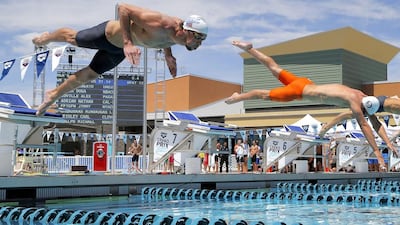PHOENIX // He did not win any gold medals or set any world records, but Michael Phelps ticked all the boxes he needed in his comeback to competitive swimming.
Only time will tell whether Phelps will stick with his comeback, swim at the 2016 Rio Olympics and possibly add to his 18 gold medals.
For now, the signs are all good. The 28-year-old American deliberately chose a relatively low-key meet in suburban Phoenix, Arizona, for his return and competed in two events, but there were enough signs to show he can do it if he wants to.
“On the whole, I think it felt pretty good,” he said.
“I was very excited. I felt like a kid again and that was the coolest thing about it.”
Despite his staggering achievements, Phelps and long-time coach Bob Bowman have always been coy about revealing their plans and nothing has changed. Both insist they have not hatched any long-term goals and are sticking to the mantra that they are taking things one day at a time, although a clearly relaxed Phelps said he was enjoying himself and his times indicated he was already in good shape.
“I was just kind of literally getting my feet wet again,” he said. “This is one meet, it’s one race. It’s a long way from whether I decide to continue or not, but this was awesome.
“I’m really excited about how things went, and I do know what I need to do if I want to continue and want to swim faster and obviously I like swimming faster and faster every race.”
While Rio may still be more than two years away, Phelps and Bowman did give away some clues about their short-term plans.
Phelps will swim again at another USA Grand Prix meet in Charlotte, North Carolina, next month before heading to Colorado for intense high-altitude training.
In their previous incarnation, Bowman put Phelps through a torturous training routine to get him into shape to cope with a heavy race schedule, but Phelps has dramatically cut back on his workouts this time, even though he piled on almost 18 kilograms in retirement.
Although neither man will talk about which races they may target in Rio de Janeiro, Bowman has already indicated that it will be fewer races and shorter events.
“His training is much different. It’s actually half, and in some cases a third, of what he used to do,” Bowman said. “What we’re doing wouldn’t work for 17 swims in eight days, but it might work for six or seven swims in shorter races.
“It’s actually fun. I’m sort of experimenting with stuff I didn’t have the guts to do before. Basically, he’s not swimming as far, he’s only been training once a day.”
The only thing Phelps would publicly confirm about his plans was that he was ditching the 400 metre individual medley – the most gruelling, lung-bursting event on the Olympic swimming schedule, which he won at Athens and Beijing but lost in London. “I’m not ever going to swim the 400 IM again. I will guarantee you,” Phelps said. “I’m putting that out there. I’m never swimming the 400 IM again. That will not be a race we will compete in.”
Bowman could not resist poking fun at Phelps, who also vowed that he would never make a comeback after he quit the sport in 2012.
“Is that kind of like I will never ever swim again?” Bowman asked. “I’m just trying to make sure we’re clear on that.”
Gregg Troy, who was the head coach of the men’s team at London, was impressed by what he saw from Phelps.
“He’s the best, it’s simple as that,” Troy said. “He’s capable of doing anything he decides he wants to do. He’s actually at the prime age for males, he’s not over the hill by any means. But it’s up to him to decide for himself.”
Bowman was also pleased with Phelps’s return.
He comfortably won his 100m butterfly heat on Thursday, then finished a close second to old rival Ryan Lochte in the final that night, showing some unsurprising signs of rustiness.
Phelps was welcomed back to the swimming fold like a long lost brother. Tickets for the event sold out within hours and there were five times more media in attendance than for the corresponding meet last year.
A television station sent a helicopter to hover over the pool just to catch a shot of Phelps in practice while his former teammates and rivals were gushing about his return.
On Friday, Phelps went back to work on his technique, opting to swim butterfly in the 50m freestyle heats, which effectively killed any chance he had of making the final against competitors swimming the faster front crawl.
He also qualified for the national championships in California in August, which loom as the first big watershed moment for his long-term plans.
The championships double as the US selection trials for next year’s world titles and will be the next big clue to where Phelps’s comeback is heading.
“Let’s just see what’s down the road,” Bowman said. “He has an opportunity if he wants to take advantage of it.”
* Reuters

